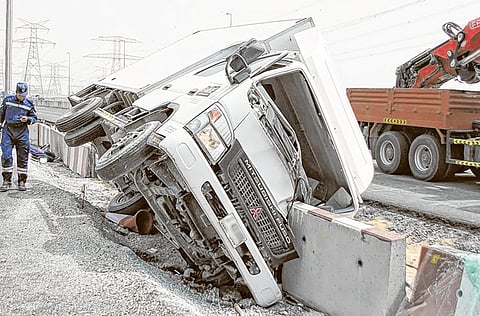What drives heavy vehicle accidents in UAE?
Horrific crash of minibus in Dubai puts focus back on many accidents involving heavy vehicles

Dubai: The horrific crash of a minibus on Emirates Road on May 10 which left 13 workers dead and 15 injured puts the focus back on the many accidents involving heavy vehicles and buses.
Are these drivers sufficiently trained? How tough are the training methods? Or are many of them are overworked and denied adequate rest? Or, as is usually said of them, are they simply reckless drivers?
Reckless driving among truck and bus drivers is not a trend, said Colonel Saif Muhair Al Mazroui, Director of the Dubai Traffic Police Department.
The recurring accidents involving buses and trucks are not due to a lack of training either, he said.
The causes of an accident could be many, he said. If the driver and the passengers are not injured from the impact of the collision, they could be injured because of the things being transported along with them.
The police are always alert to any violation in this regard. In some instances, vehicles transporting people and dangerous objects like gas cylinders have been confiscated.
Other violations included buses carrying more passengers than they are meant to carry and, in one case, a bus that was parked on the hard shoulder with all its passengers and driver sleeping.
“In all these cases, we confiscated the bus on the spot,” said Col Al Mazroui.
He said the companies the drivers work for are primarily to blame, followed by the driver.
“When we stop drivers for violations such as transporting people and tools, they say that the company told them to do so. [The problem is] that drivers don’t have a traffic culture. When a driver speeds, it’s not because he is not well-trained or that he was not told that he should not speed, but because he lacks self-control.”
The other issue related to accidents could also be driver fatigue.
Companies, said Col Al Mazroui, overwork drivers by making them drive for long hours without sufficient time to rest.
Traffic safety
Dubai Police have a schedule of traffic awareness campaigns every year to enforce traffic culture in all sectors of society.
In addition to campaigns, the Dubai Police have also taken a different approach with the white points system, said Col Al Mazroui, which awards drivers for being safe drivers.
“We award people for doing the right thing. We want people to not think of Dubai Police as a entity that just punishes and fines people.”
Another factor that helps increase traffic awareness is involving the public by giving them the tools to report violators. Col Al Mazroui said they get a lot of calls, as well as photos, through the Dubai Police app to report violations.
Understanding the reasons for trucking accidents, and the relationships among the entities connected to the truck and the load will help authorities determine what caused the accident, said Lt Col Ahmad Bin Darwish, head of the Patrol Department of Sharjah Police.
Lt Col Bin Darwish said they constantly deploy Anjad police patrols to monitor the flow of traffic, “and if we see trucks passing through the city when they are not supposed to, they are fined”.
The many factors to be considered when determining the cause of an accident are “the truck’s driver, owner of the truck or trailer, person or company that leased the vehicle, manufacturer of the vehicle and tyres or other parts”.
Common causes of truck accidents
1. The most common causes of truck accidents are driver error prior to and during the trip, mechanical failures, weather conditions, road design, and traffic signal failures.
Factors such as the use of prescription and over-the-counter drugs, speeding, fatigue, inattention, distractions, work environment, and unfamiliarity with the road all can contribute to driver error. But by far the most common causes of trucking accidents are driver fatigue and sleep deprivation.
2. Equipment failure
3. Brake failure due to inadequate adjustments
4. Tire blowouts due to wear
5. Improper securing or load distribution, contributing to truck rollover
6. Defective steering
7. Improper trailer attachment
8. Defective side or rear lighting
9. Transmission failure.
Source: Sharjah Police. With inputs from Agaddhir Ali, Staff Reporter



